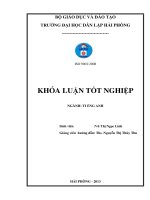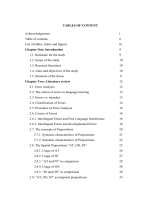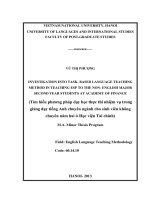The difficulties encountered by first-year English-major students at Academy of Finance when learning the reading skill in the course book Intelligent business (Pre-intermediate)
Bạn đang xem bản rút gọn của tài liệu. Xem và tải ngay bản đầy đủ của tài liệu tại đây (276.2 KB, 5 trang )
VIETNAM NATIONAL UNIVERSITY, HA NOI
COLLEGE OF FOREIGN LANGUAGES
POST GRADUATE STUDIES
********
LƯU THỊ LAN PHƯƠNG
THE DIFFICULTIES ENCOUNTERED BY FIRST-YEAR ENGLISH-MAJOR
STUDENTS AT ACADEMY OF FINANCE WHEN LEARNING THE READING
SKILL IN THE COURSE BOOK INTELLIGENT BUSINESS (PRE-INTERMEDIATE)
NHỮNG KHÓ KHĂN MÀ SINH VIÊN NĂM THỨ NHẤT CHUYÊN ANH, HỌC VIỆN
TÀI CHÍNH, GẶP PHẢI KHI HỌC KỸ NĂNG ĐỌC TRONG GIÁO TRÌNH
INTELLIGENT BUSINESS, PRE-INTERMEDIATE
MA Minor Programme thesis
Field: English Methodology
Code: 60.14.10
Supervisor: M.A. Lâm Phúc Hân
HANOI- SEPTEMBER 2009
TABLE OF CONTENTS
CANDIDATE’S STATEMENT …………..………………………………………………….i
ACKNOWLEDGEMENTS...……………………………………………...…………………ii
ABSTRACT ..…………………………………………………………………………...……iii
TABLE OF CONTENTS……..………………………...…………………………………....iv
LIST OF ABBREVIATIONS…..………………..…………………………………………...v
LIST OF FIGURE AND TABLES……………………………...…………………………...vi
Chapter 1: INTRODUCTION
1.1 Rationales ………………………………...……………………………………….. 1
1.2 Significance and aims of the study ………………………………………………... 2
1.3 Research Questions ……...……………………………………………………… ...2
1.4 Methods of the study …………………………………….......……………………..3
1.5 Scope of the study ………………………………………...………………………..3
1.6 Design of the study ...……………………………………………………………… 4
Chapter 2: LITERATURE REVIEW
2.1 An overview of reading and reading comprehension ...……………………………5
2.1.1 Definition of reading and reading comprehension ...…………………………… 5
2.1.1.1 Definition of reading ...……………………………………………………….. 5
2.1.1.2 Definition of reading comprehension ……………………………………….. 6
2.1.2 ESP and Reading comprehension in ESP ………………………………………. 7
2.1.2.1 Definition of ESP and reading comprehension in ESP ...……………………. .7
2.1.2.2 Types of reading exercises in ESP ...…………………………………………. 9
2.1.3 Reading difficulties for language learners ……………………………………….9
2.1.3.1 Reading skill problems …..……………………………….…………………. 10
2.1.3.2 Language problems …………………………………………………………...11
2.1.3.3 Background knowledge problems ...………………………………………. ...12
2.2 An introduction of course book “Intelligent Business” (pre-intermediate) and the
current context of learning reading skill in this book ... …………………………………...…14
2.2.1 General description of course book “Intelligent Business” (pre-intermediate) ...14
2.2.1.1 Aims and approaches …………………………………………………………14
2.2.1.2 Design and organization ...……………………………………………………15
2.2.2.3 Language content ……………………………………………………………..15
2.2.1.4 Skills ...………………………………………………………………………..16
2.2.1.5 Topics ..………………………………………………………………….……17
2.2.2 Characteristics of reading texts and reading exercises …………………...…….17
2.2.2.1 Characteristics of reading texts ……………………………………………….17
2.2.2.2 Characteristics of reading exercises ...………………………………………..18
2.2.3 Current situation of teaching course book ……………………………………..19
2.2.3.1 Length of the course and time allocation for reading skill ...…………………19
2.2.3.2 Teaching facilities …………………………………………………………….19
2.2.3.3 Students and their background ...……………………………………………..20
2.2.4 Summary ………………………………………………………………………..20
Chapter 3: METHODOLOGY
3.1 Context of the study ………………………………………………………………21
3.2 The subject and participants ...……………………………………………………22
3.3 Data collection instruments ...…………………………………………………….22
3.4 Data collection procedure ..………………………………………………………23
3.5 Data analysis procedure ………………...………………………………...……....24
3.6 Summary ……………………………………………………………………….…25
Chapter 4: RESULT AND DISCUSSION
4.1 Difficulties encountered by the students when learning reading skill ……………26
4.1.1 Data analysis of the classroom observation …………………………………….26
4.1.2 Students’ reading difficulties in terms of reading skills ……………………..…28
4.1.3 Students’ reading difficulties in terms of background knowledge ...………...…30
4.1.4 Students’ reading difficulties in terms of vocabulary …………………………..32
4.1.5 Students’ reading difficulties in terms of other areas ...………………………...33
4.2 Pedagogical implication and suggestions ...………………………………………34
4.2.1 Training students to become efficient readers ...………………………………..35
4.2.1.1 Training students with different reading strategies ...……………….………..35
4.2.1.2 Assigning and checking students’ fulfillment of homework …………………37
4.2.1.3 Encouraging students’ extensive reading habits …………………………..….37
4.2.2 Improving economic background knowledge for the first year students at FFL 38
4.2.3 The teachers’ being aware of their students’ needs ……….……………………39
4.2.4 The Academy of Finance’s being aware of the needs of the students at FFL .....39
4.3 Summary ………………………………………………………………………….40
Chapter 5: CONCLUSION
5.1 Summary of the study ……………………………………………………………..41
5.1 Limitations and Suggestions for further study ...………………………………….42
REFERENCES…..…………………………………………………………………………….i
APPENDICES…………………………………………………………………………………ii
ABSTRACT
It is undeniable that out of the four macro English skills, reading is of the most
paramount importance to the students at Academy of Finance in general and the students at the
Faculty of Foreign Languages in particular. The Intelligent Business series have been used as
main textbooks for at FFL and the reading texts in Intelligent Business course book preintermediate have exposed some problems to students. Thus, this study is an attempt to
discover those difficulties to maximize the students’ interests and success in learning reading.
The data obtained from class observation and survey questionnaire for the students at
FFL show that the students have problems with their reading texts in course book Intelligent
Business in terms of vocabulary, reading skill and background knowledge.
Based on the results obtained from data collection instruments, the researcher has come
up with some pedagogical implication and suggestions for the students, teachers and the
Academy as well.
Hopefully, this study will bring about more effective and appropriate solutions to the
students at FFL and at the same time, serve as a reference for those who indulge their burning
interests in the field of teaching methodology.









